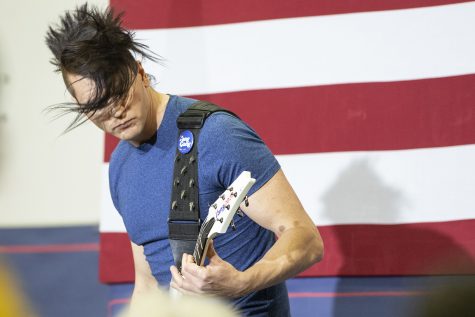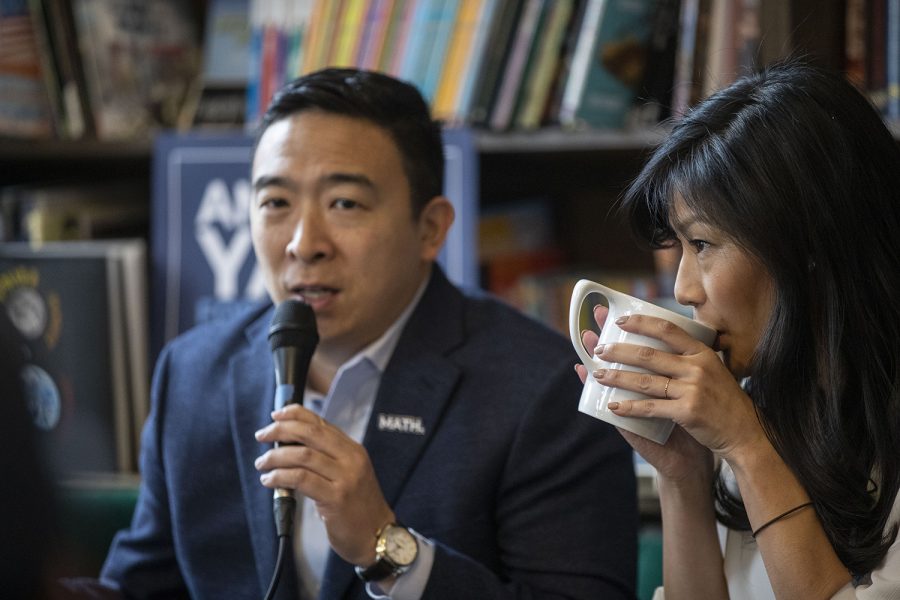Andrew Yang highlights family’s experience with autism to finish Iowa tour
Throughout his campaign, Andrew Yang has focused on his family’s experience with his son Christopher, who is on the autism spectrum. He opened up about his family’s story with his wife, Evelyn, at a packed University Heights Café and Bookshop.
Democratic candidate Andrew Yang speaks as his wife Evelyn Yang takes a drink during a roundtable on the topic of family and autism at Sidekick cafe in University Heights on Saturday, Dec. 14, 2019. The Yang’s shared their experience with their son Christopher, who is on the autism spectrum.
December 14, 2019
Iowa City West High senior Aaron Fennell-Chametzky didn’t know what question he would ask presidential hopeful Andrew Yang before he raised his hand in the middle of a crowded bookstore.
The event he attended, hosted by the Iowa City Autism Community, was a moderated discussion with Yang and his wife Evelyn, on barriers that people with autism and disabilities face. The Yangs’ son, Christopher, has autism, and both continually referred to their experiences as a family looking for resources for their son.
Fennell-Chametzky started his question by saying he’d seen the candidate four times already — he’s supported Yang for about a year, before #yanggang started trending — and went to Iowa City West High School.
“I was just talking about how I’ve seen him… because I was thinking of a question and I had to delay time,” Fennell-Chametzky said in an interview later.
Fennell-Chametzky, who is on the autism spectrum himself, settled on asking Yang about what the nomination-candidate thought about the culture of masculinity, and the challenges people on the spectrum sometimes face with fitting into binary stereotypes.
Yang answered by referencing his son, saying he believed having his son in the White House would normalize autism and questions of masculinity. He also said he supported more resources in schools so that kids could learn social and emotional health tools.
A group of about 100 people packed into the Sidekick Bookstore and Café.
The 17-year-old plans to caucus for Yang, saying he finds him personable and likes the idea of Universal Basic Income — one of Yang’s main campaign planks is giving every American $1,000 a month.
“He’s definitely the most personable and relatable candidate,” Fennell-Chametzky said. “And he seems to check all the boxes. And then when I saw he’s doing something with autism, I thought, ‘this is surreal’.”
During the event, Yang focused on improvements he sees that could made to schools across the country to better accommodate people with autism. He said he favored de-emphasizing the importance of standardized tests, implementing counselors in schools instead of police officers, and encouraging social- and emotional-learning programs.

Attendees wait during Family and Autism roundtable hosted by Democratic candidate Andrew Yang at Sidekick cafe in University Heights on Saturday, Dec. 14, 2019. The Yang’s shared their experience with their son Christopher, who is on the autism spectrum.
A common thread for Yang throughout the discussion was cautioning against equating “economic value” with “human value”.
“Now, we’ve all been collectively brainwashed to think that economic value and human value are the same things,” he said. “And one of the traps that special needs families fall into is to say, ‘Well, if you had the right organization or employment opportunity, then my son or daughter would be able to contribute.’ And that is very true. But that should not be the point.”
Yang has often talked on the campaign trail about his family’s experience with raising his oldest son, Christopher, who was diagnosed at an early age with autism. Yang released an ad focusing on his son and spoke at a disabilities forum in Cedar Rapids Nov. 2.
“Any family with an autistic child knows that it becomes a part of you. I am not the first presidential candidate with autism or special needs in my family, but for some reason I may be the first to talk about it,” Yang said to reporters after the family and autism roundtable in University Heights.
Dina Bashara, a co-founder of the Iowa City Autism Community, moderated questions for the Yangs. She’d gotten a message from the Yang campaign to host the event, and thought the opportunity of a presidential candidate’s interest came only “once in a blue moon”. The organization doesn’t endorse a candidate, but regardless of who wins the nomination, she said a person with a national platform speaking about autism elevates the topic with media, and can pique the interest of people who turned out to see Yang as a national political figure.
“It also gives him an inside view of the terrible state of so many services that are supposed to be in place for people with disabilities and their families,” Bashara said.
A couple miles away, at Iowa City’s South East Junior High School, Yang took the stage about an hour and a half after his rally was slated to begin. But, it didn’t seem to mute the cheers of the group of a couple hundred that gathered, standing, on the gym floor.

Kyle Christensen plays the guitar during Democratic candidate Andrew Yang’s “50 Days Left” rally at Iowa City South East Junior High School on Saturday Dec. 14, 2019. Christensen was one of the first recipients of his Freedom Dividend, which gives the Christensen household $1,000 a month.
Beforehand, campaign volunteer, Kenta Kodama, appealed to the audience of about 300 (by Yang’s count) to help grow the presidential campaign and its on-the-ground resources such as volunteers to door knock and phone bank.
The Iowa City event culminated Yang’s longest trip to Iowa yet. He traveled in a new, blue bus, played basketball with Democratic Congressional candidate J.D. Scholten, and christened a few of his now more than a dozen field offices in Iowa. Real Clear Politics average’s Yang’s polling at 3.2 percent. He’s qualified for the Democratic debates to be held December 19 as candidates who’ve held political office before — Sen. Cory Booker of New Jersey and former Secretary Julián Castro — did not.
Once Yang himself took the stage, he referenced the trajectory his campaign has set since he announced two years ago. He held a “rally” at the Iowa Memorial Union a year ago, and about 40 people turned out to see him.
“I started this campaign two years ago no one had ever heard of me, you had never heard of me,” Yang said. “And I stand before you tonight number five in national polls. And one of seven candidates to make the debate stage next week.”



